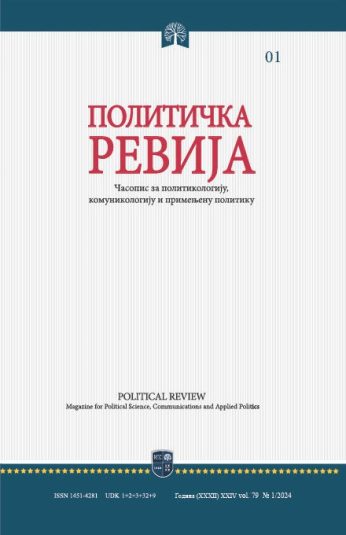Main topic
INTERNATIONAL ISSUES
THE ROLE OF CIVIL – MILITARY RELATIONS IN THE DEVELOPMENT OF THE REPUBLIC OF TURKEY
Abstract
The purpose this study is to provide a comprehensive illustration od military activities in the Republic of Turkey, analyzing the position and the role of the army in the political system of this country. First of all the role of army leaders in founding the Republic at the beginning of the 20th century will be presented in order to make later influences easier to understand. Then the institutional evolution of Turkish army as well its fall after 2002 will be shown in chronological order. Consequently this provides and opportunity to make more general conclusion regarding the nature of the Turkish system. To sum up, the analyses of military coups from 1960 to 2016 will provide data on the influence and consequences of army activities in the developments of the Republic of Turkey. Modern day trends of marginalization and diminishing of the power of Turkish army will be discussed and analyzed. To be precise, the ultimate conclusion to be drawn from this research points out to fact that Turkish army gradually became victim of its own misconceptions and mistakes. The final section of this study deals with the series of events which represent the climax of continuous frictions in civil–military relations that had existed for decades.
References
- Ајзенхамер, В. Владимир. 2017. „Односи Републике Турске и Сједињених Америчких Држава током деценије владавине Партије правде и развоја (од 2002. до 2012. године)“. Докторска дисертација. Универзитет у Београду: Факултет политичких наука.
- Армстронг, Ц. Харолд. 1938. Кемал паша – Сиви вук. Београд: Народна култура.
- Гаћиновић, Радослав. 2014. „Друштвена улога војске у изградњи безбедности државе“. Војно дело, 66 (2), 129–144.
- Ђурић, Живојин и Владимир Ајзенхамер. 2011. „Политички систем Турске на размеђу кемализма и исламизма“. Српска политичка мисао, 34 (4), 441–466.
- Ђурковић, Миша. 2013. „Односи Турске и Сједињених Америчких Држава“. У: Турска – регионална сила, ур. Александар Раковић, Миша Ђурковић, 120–137. Београд: Институт за европске студијe.
- Ђурковић, Миша. 2013. „Фетулах Гјулен и џемат Хизмет“. У: Турска – регионална сила, ур. Александар Раковић, Миша Ђурковић, 63–83. Београд: Институт за европске студије.
- Павловић, К. Стеван. 2018. Историја Балкана 1804–1945, Београд: Клио.
- Симеуновић, Драган. 2002. Теорија политике – практикум. Београд: Наука и друштво.
- Спасојевић, Душан. 2016. Између Турске и Европе – записи и сведочанства између две дипломатске мисије. Београд: Чигоја штампа.
- Спасојевић, Душан. 2013. „Улога војске у Турској кроз историју и данас“. У: Турска регионална сила, ур. Александар Раковић, Миша Ђурковић, 42–46. Београд: Институт за европске студије.
- Танасковић, Дарко. 2010. Неосманизам – доктрина и спољнополитичка пракса. Београд: Службени гласник.
- Томић, С. Зоран. 1939. Камал Ататурк – творац нове Турске. Београд: Планета.
- Ahmad, Feroz. 1993. The making of modern Turkey. London: Routledge.
- Ari, L. Basak. 2007. “Civil–Military Relations in Turkey”. Applied Research Projects, Texas State University–San Marcos. Paper 248. http://ecommons.txstate.edu/arp/248
- Capezza, David. 2009. “Turkey’s Military Is a Catalyst for Reform: The Military in Politics”. Middle East Quarterly, 16 (3), 13–23.
- Derpanopoulos, G., Frantz, E., Geddes B., and Wright, J. 2016. “Are coups good for democracy?”, Research and Politics, 3 (1), 1–7.
- Edroos, Faisal i Ahmed El Amraoui. 2018. „Zašto turska vojska nije što je nekad bila?“. Al Jazeera Balkans. http://balkans.aljazeera.net/vijesti/zasto-turska-vojska-nije-sto-jenekad-bila.
- Erdağ, Ramazan. 2019. “After the Failed Military Coup: The Need for the Organizational Reform in the Turkish Military”. All Azimuth, 8 (1), 55–68.
- Güler, Arzu and Cemal А. Bölücek. 2016. “Motives for reforms on civil–military relations in Turkey”, Turkish Studies, 17 (2), 251–271.
- Güney, Aylin, and Petek Karatekelioğlu. 2005. “Turkey‟s EU Candidacy and Civil–Military Relations: Challenges and Prospects“. Armed Forces & Society, 31 (3), 439–462.
- Hantington, P. Semjuel. 2004. Vojnik i država – teorija i politika civilno-vojnih odnosa. Beograd: Centar za studije Jugoistočne Evrope, Fakultet političkih nauka, Diplomatska akademija.
- Jović, Dejan. 2016. „Turska“. U: Bliski istok, ur. Mirjana Kasapović, 354–371. Zagreb: Fakultet političkih znanosti.
- Kadercan, T. Pelin, and Burak Kadercan. 2016. “The Turkish Military as a Political Actor: Its Rise and Fall“, Middle East Policy, 23 (3), 84–99.
- Lalić, Vojislav. 1997. Turska bez Ataturka. Beograd: Filip Višnjić.
- Mandaci, Nazif. 2012. “Turkey’s Unfinished Transition to Democracy“. In: Democratic Consolidation in Turkey, ed. Müge Aknur, 63–115. Boca Raton: Universal Publishers.
- Mujadžević, Dino. 1998. „Vojska i politika u Republici Turskoj“, Polemos, 1 (2), 203–221.
- Narli, Nilufer. 2009. „Promene u turskoj bezbednosnoj kulturi i civilno-vojnim odnosima“, Bezbednost Zapadnog Balkana, 4, (14), 56–83.
- Örmeci, Ozan. 2017. “Military Coups: Do They Still Matter in the 21st Century and the Turkish Example“. Scottish Journal of Arts, Social Sciences and Scientific Studies (SJASS), 29 (2), 98–122.
- Powel, Jonathan, and Clayton L Thyne. 2011. “Global instances of coups from 1950 to 2010: A new dataset“. Journal of Peace Research, 48 (2), 249–259.
- Sarigil, Zeki. 2014. “The Turkish Military: Principal or Agent?“, Armed Forces & Society, 40 (1), 168–190.
- Schiff, Rebecca L. 1995. “Civil-military relations reconsidered: A theory of concordance“, Armed Forces & Society, 22 (1), 7–24.

